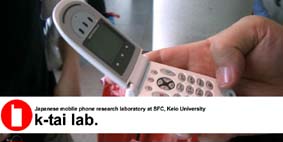Keitai Laboratory
* This laboratory has been completed.
| Date of establishment | April 1, 2004 |
|---|---|
| Director | |
| Contact |
Keio University Shonan-Fujisawa Campus DOCOMO HOUSE
Tel:+81-466-47-5111 ex53665 |

Objective
The emergence of a communications environment predicated on mobile telephones has had a direct and indirect impact on all aspects of our lives, organizations, human relations and communities. Japanese mobile telecommunications have taking a unique development trajectory compared with other countries and are a focus of interest among researchers worldwide. For example, Japanese mobile telecommunications: 1) developed primarily among younger people, 2) have seen explosive spread of “Mobile Internet” and 3) have seen rapid spread of mobile telephones with built-in cameras.
Technological change and social change are closely intertwined, and it is extremely important to perform interdisciplinary academic research on their mutual structural relationships. This laboratory researches the social and cultural impact of the mobile phone from a wide range of perspectives and approaches, and through this research attempts to describe the nature of the “ubiquitous society.” By establishing this laboratory we have created a program that cuts across graduate-level disciplines in providing for group studies, research and academic instruction.
Outline of research activity plans
- Year 1: Survey of issues in the existing research and design of research process(April 2004-March 2005)
During the first year we will conduct a comprehensive review of studies and research currently in progress, focusing on the keyword “mobile telephone.” This review will allow us to reconfirm the mission of the laboratory. We will then formulate a research plan and study the technologies and methodologies upon which it will be based. Among the themes covered will be research into the acceptance and spread of mobile telephones, research into the use of mobile telephones, research into the potential for mobile telephones in the ubiquitous society, research into the use of mobile telephones in social studies and research into mobile telephone-based systems and services. Technology-oriented researchers will develop a social research system comprising the information-gathering software, databases, data mining and other components needed for the project in line with the requirements of social sciences-oriented researchers. - Year 2: Survey and empirical research(April 2005-March 2006)
During the second year we will begin empirical research (including field work etc.) in addition to the survey in progress. The laboratory will hold workshops and research presentation meetings, and will continually revise and refine the survey process until a final output image is arrived at. Empirical research results will be fed back into the process to improve the survey system. Our goal will be to engage in project activities that are open to both the domestic and international communities rather than limited to SFC. More specifically, we will upgrade the previous year’s research presentation meetings to the academic association level and will begin building an international research network. - Year 3: Publication and evaluation of findings(April 2006-March 2007)
During the third year we will summarize and publish the findings of the first two years. We plan to disseminate the activities of the laboratory through presentations at international symposia and international scholarly societies and through papers in academic publications. We will also evaluate past research activities and study future directions and issues.
Researchers, managers and professors
| Fumitoshi KatoDirector | Professor, Faculty of Environment and Information Studies |
|---|---|
| Kenji Kumasaka | Professor, Faculty of Environment and Information Studies |
| Katsuhiko Ogawa | Professor, Faculty of Environment and Information Studies |
| Tomoyuki Furutani | Associate Professor, Faculty of Policy Management |